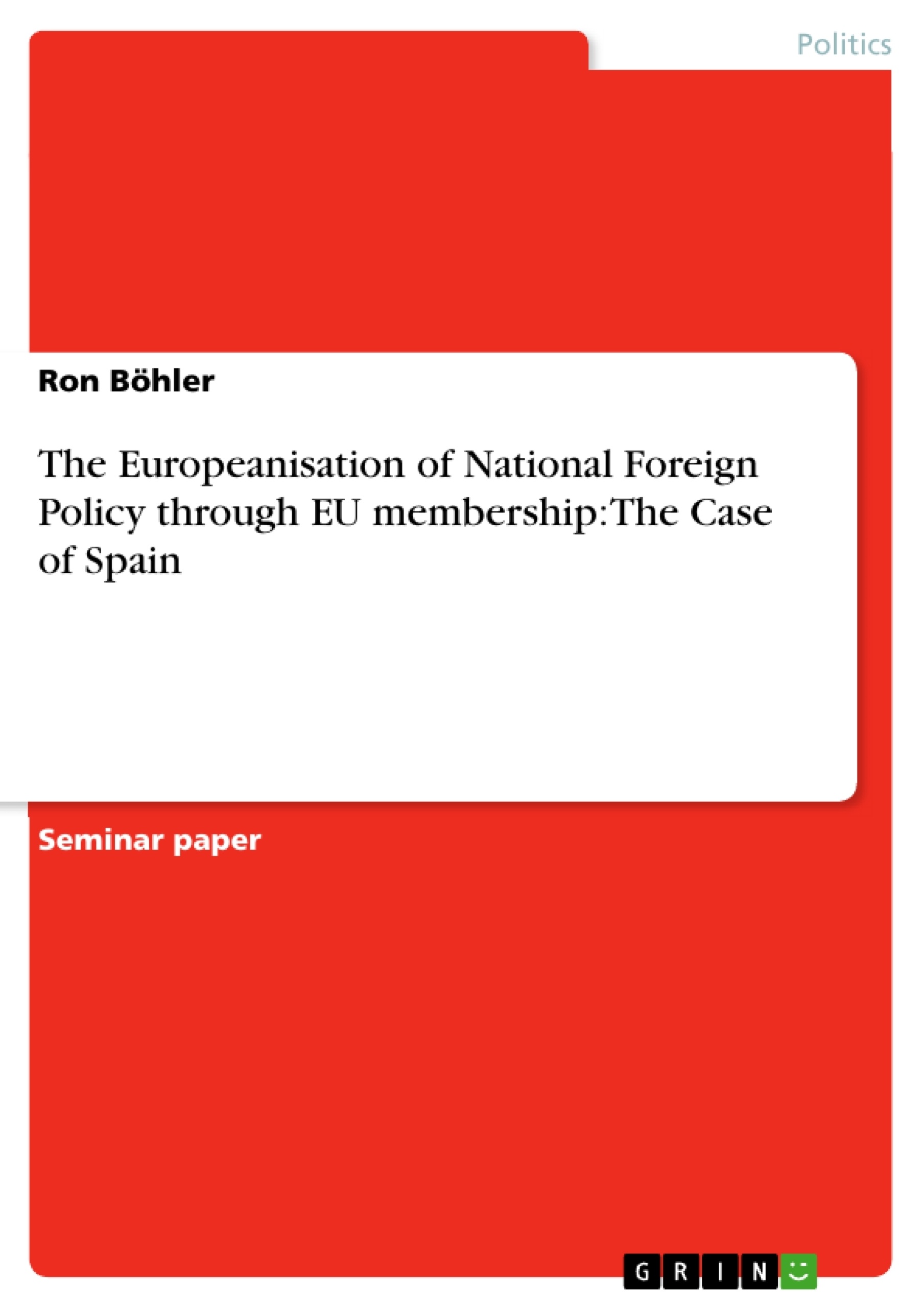‘For the last thirty years, Spanish foreign policy has had a single (though double-barrelled) objective: first, integration in Europe; secondly, integration of Europe.’
(Torreblanca 2010, p.10).
Not quite a decade after twelve European countries agreed on a Common Foreign and Security Policy (CFSP), national foreign policies among the EU have ‘significantly been changed, if not transformed, by participation over time in foreign policy making at the European level’ (White 2001, p.6). This, indeed, says little about the nature and direction of the changes that occurred and whether these conduced to general foreign policy convergence among EU member states or perhaps even fostered greater divergence.
In recent years, Europeanisation processes of national foreign policies have attracted more and more scholarly attention. While some case studies focus on the European impact on Central and Northern European states, for instance the Netherlands, Denmark and Ireland (Tonra 2001), others evaluate the distinctive features of the ‘Big Three’ – France, the United Kingdom and Germany – in EU foreign policy-making (Wong 2006; Gross 2009; Aggestam 2011 Forthcoming). In contrast, EU states in the Southern periphery have substantially been described as adaptive laggards that ‘displayed remarkably resilient and distinctive features of state tradition and political culture despite the pressures of the EU’ (Featherstone and Kazamias 2001, p.2). One of these countries, Spain, joined the European Union at a time when joint efforts to encourage a common foreign and security policy framework were still in the early stages of development. It will be argued below that Spain, at first assumed to be an enfant terrible within the European foreign policy framework, turned out to be an enfant sage with greater ambitions. From the viewpoint of social constructivism, the changing behaviour as well as the active role that Spain took very early in European foreign policy will be portrayed.
Inhaltsverzeichnis (Table of Contents)
- I. Introduction
- .1 The Europeanisation of National Foreign Policies: Theoretical Approaches
- .2 The Europeanisation of National Foreign Policy: Against all odds?
- II. The Europeanisation of National Foreign Policies: Theoretical Approaches
- III. Foreign Affairs between European Union and the Member State: The Case of Spain
- 1. EU's Impact on Spanish Foreign Policy Administration
- 2. Towards Europeanisation of Spanish Foreign Policy?
- IV. Conclusion
- V. Bibliography
Zielsetzung und Themenschwerpunkte (Objectives and Key Themes)
This paper aims to explore the impact of Europeanization on national foreign policies, specifically focusing on the case of Spain. It examines how the EU's foreign policy framework has influenced Spanish foreign policy administration and how Spain has navigated its integration into the European foreign policy structure. The paper delves into theoretical approaches to Europeanization and analyzes Spain's role within the Common Foreign and Security Policy (CFSP) to understand the dynamics of foreign policy convergence and divergence among EU member states.
- Europeanization as a process of policy change and institutional adaptation
- The role of the European Union in shaping national foreign policies
- The case of Spain as an example of foreign policy Europeanization
- The interplay of institutional settings, national interests, and European pressures in foreign policy making
- The evolving nature of the Common Foreign and Security Policy (CFSP)
Zusammenfassung der Kapitel (Chapter Summaries)
- I. Introduction: This chapter provides a brief overview of the topic and highlights the significance of Europeanization in shaping national foreign policies. It introduces the case of Spain as an example of a country that has actively engaged with the European foreign policy framework, despite initial expectations of a less active role.
- II. The Europeanisation of National Foreign Policies: Theoretical Approaches: This chapter explores three distinct theoretical perspectives on Europeanization: a cyclical model of ongoing interactions between national and European levels, a bottom-up approach emphasizing national impact on European structures, and a top-down process highlighting EU influence on domestic policies. The chapter delves into the concepts of policy transfer, institutional adaptation, and the role of norms and beliefs in shaping national political systems.
- III. Foreign Affairs between European Union and the Member State: The Case of Spain: This chapter examines the specific case of Spain, analyzing the EU's influence on Spanish foreign policy administration. It explores how Spain has adapted its institutions and policies to align with European priorities and assesses whether this adaptation reflects a genuine Europeanization of Spanish foreign policy.
Schlüsselwörter (Keywords)
This paper focuses on the key concepts of Europeanization, national foreign policy, EU foreign policy, Common Foreign and Security Policy (CFSP), institutional adaptation, policy convergence, policy divergence, and the case of Spain. It explores how national interests, European pressures, and institutional settings shape foreign policy decision-making in the context of European integration.
Frequently Asked Questions
What is the main focus of this study on Spanish foreign policy?
The paper explores the impact of Europeanization on Spain's national foreign policy and how its participation in the EU has transformed its diplomatic administration.
What are the three theoretical approaches to Europeanization mentioned?
The study analyzes a cyclical model of interaction, a bottom-up approach (national impact on EU), and a top-down process (EU influence on domestic policy).
How was Spain initially perceived within the EU foreign policy framework?
Spain was initially assumed to be an "enfant terrible" but proved to be an "enfant sage" with significant ambitions in European integration.
What is the Common Foreign and Security Policy (CFSP)?
The CFSP is the EU's framework for joint foreign and security policy, which has led to varying degrees of convergence among member states.
Does EU membership lead to foreign policy convergence?
The paper examines whether Europeanization leads to a general convergence of policies or if it might foster greater divergence based on national interests.
What role does social constructivism play in this analysis?
Social constructivism is used to portray the changing behavior and the active role Spain adopted early in European foreign policy making.
- Citation du texte
- Ron Böhler (Auteur), 2011, The Europeanisation of National Foreign Policy through EU membership: The Case of Spain, Munich, GRIN Verlag, https://www.grin.com/document/376556



